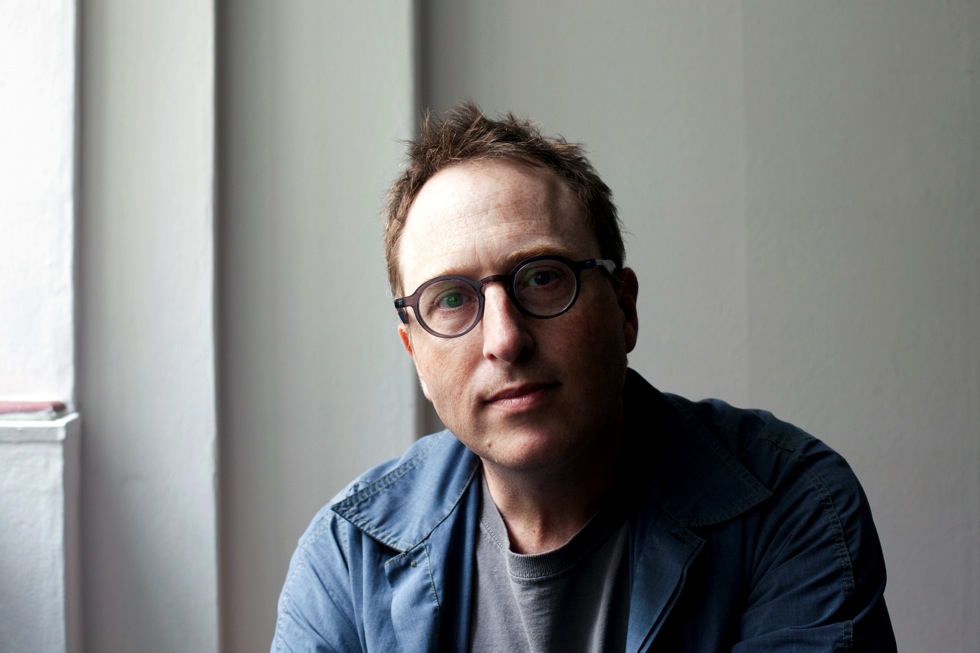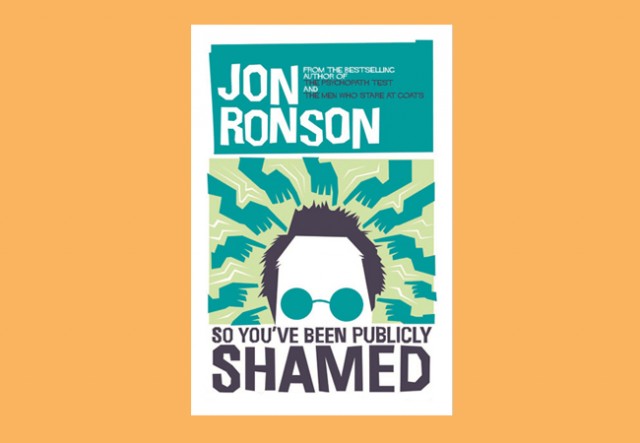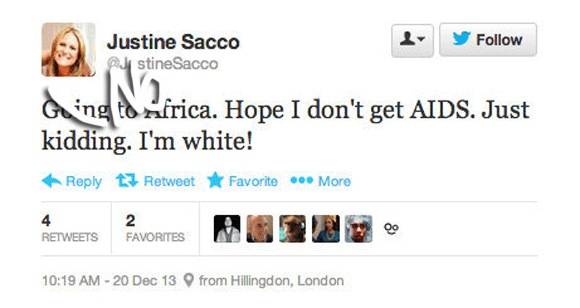“I was grappling with something that was truly horrifying” — The Big Interview: Jon Ronson (Part One)

He’s investigated psychopaths, extremists, and now the rise of public shaming online. Here, critically acclaimed journalist Jon Ronson speaks to us at length about his new book, how he feels about shaming a spambot, and why this book more than any other has given him sleepless nights…
The Double Negative: Hi Jon. You’ve interviewed some high profile people in your time — and some fairly terrifying people. I was wondering if you could give me any tips for this interview?
Jon Ronson: [laughs] Well I’m not that terrifying.
You’re not going to give me a hard time then?
The only tip I every give anybody about interviews is: don’t have a list of questions. Although some people think that’s kind of ridiculous, you know, if you forget what you’re going to ask, but I really like the idea of being a like twig in the tidal wave of the conversation, so it’s good to not have questions. That’s the only thing I would suggest.
Thanks, duly noted [shuffles questions to one side]. I’ve read your new book — So You’ve Been Publicly Shamed. It starts with you confronting the men who created a ‘Jon Ronson’ spambot…
The ‘infomorph.’
… Yes… And I’ve just watched the video. That was an incredibly uncomfortable watch. I was just wondering what your reflections on that public shaming experience are now, two years on, and with it being such an important story in the book.
I still find them and what they did quite baffling. I haven’t changed my view on how baffled I feel. I’m more grateful towards them because I’m not 100% sure I would have written this book if that experience hadn’t happened to me. You never know when you’re going to get that little moment that starts the book: that amazing magical moment of a book beginning. I remember that moment in The Psychopath Test and I remember that moment in The Men Who Stare At Goats: I remember that moment in all of those books, so I’m much more grateful to them for inadvertently giving me that moment. I would like to say I would not shame them… but did I shame them? I can’t remember? Was putting the video out on YouTube shaming them? I’m not sure.
Well, I don’t know whether they liked it really: it was a chance for them to discuss their work. Although they did try to make a bit of a tenuous link between you and the economic collapse…
But he said to me at one point: “I don’t know how you are involved in the economic collapse?” Well, I’m not involved at all in the economic collapse, I had nothing to do with it.
I feel like if I’d been in your position, I would have also felt baffled but also increasingly angry. Watching back and having read the book now, I still don’t understand the justification for using you as inspiration for the spambot. But of course, they’d said it’s not you…
Yeah, I mean certainly my initial thing at the time was embarrassment, and I felt that my instinct was to not put it on YouTube, because I came over so badly. I was sort of screeching at them and was really annoying, and I was just worried about me – I was just thinking: ‘God, everyone’s going to mock me’, but I plucked up the courage and I put it on there and that wasn’t what happened at all. I was just thrilled that everybody was on my side and this huge glorious good feeling overwhelmed me. So I think that’s why I wrote the book. I’m not sure that in the moment I subconsciously realised I was going to write a book about this, but I think that moment just stayed with me and it became the book.
Do you think that moment came when you were reading the online comments left under the video? You mention one comment in the book — ‘gas the cunts: especially the middle cunt’ — really? Someone wrote that?
[Laughs] ‘Left sided bald cunt’.
You know what, the true answer is probably quite boring, which is a few months later I was in London giving a talk at Conway Hall (at this thing called The School of Life) and I was giving a talk about humiliation, and then the question somebody said to me was: ‘I saw that spambot video you did. Do you think this is why you wanted to do this story?’ And I thought, yeah. Until that person asked me that question, I don’t think it was totally conscious in my mind that I was now writing this book because of that [spambot] experience. So I thought that was kind of interesting.

For me, that’s the interesting thing about storytelling: you just never know what the moment is going to be. You’re just walking through life totally normally and then something happens, then six months later you realise the way you think has changed and that’s what leads you to write a book. You know it’s sort of interesting to me as somebody who is always looking for stories to write.
I think it’s just also something to do with how we communicate with technology. I’ve been to a few conferences recently that have addressed how unnerving it is that we’re placing intelligence on/in tech. I visited the @jon_ronson twitter account just now and it was actually really sad reading the tweets documenting its death.
[Laughs] Yeah, it was really going for that pathos.
Does the team behind the spambot still believe that it had a right to live? Have you been in contact with them recently, about the release of the book?
I haven’t been in contact with them. It’s not the only story I’ve done, though, about the relationship between intelligence and robots. I did this amazing story which is in Lost At Sea (my anthology about conscious robots) and I met this amazing woman called Martine Rothblat, who had basically built — with a former Disney imaginer — a robot version of her partner and they’re trying to make it conscious, and that’s such a great story if you’re interested.
I’ve read it — and I seem to remember that being a very weird experience for you. Didn’t you meet the robot?
Yeah, absolutely. Actually, the most emotional thing about it was actually meeting Martine [Rothblatt: a reclusive multi-millionaire who the robot is modelled on] who’d had this unbelievable life; I much preferred meeting the actual human than the robot. I mean, the robot was kind of weird because I was desperately trying to connect with it, and I sounded like a sort of… do you remember when Sue Lawley presented Desert Island Discs and she was really patronising? Kirsty Young is really sweet, but Sue Lawey was incredibly patronising. It was like she was the Queen of England, and that’s a bit what I was like interviewing Bina48. I was incredibly patronising: I was kind of like a 1960s British TV presenter going off to interview some tribe in a rainforest somewhere.
But when I met the actual Martine it was amazing, she was a truly amazing human being. You know she invented the concept of satellite radio for cars and then invented a treatment for pulmonary hypertension, and is now trying to build a conscious robot — and she’s also the richest entrepreneur in America.
It almost begs the question why someone would want to build a copy of someone else?
I think for them all, the people involved in building this technology, have done incredible things in their lives so, Peter Thiel — I think — invented PayPal [he did] was the first investor in Facebook, and then Martine invented satellite radio for cars, and all these people are like: ‘Well we’ve changed the world once, we can do it again’, and what they’re trying to do is to miraculously create immortality.
This brings me on to some of the people in your new book who have been publicly shamed; people who don’t all seem like utter arseholes, some of them seem quite nice, and yet they’ve had this brutal public downfall.
I’ve made a really big conscious decision in this book to basically write about terrible things happening to normal people. I suppose, [away from] the more eccentric, unusual people that are in some of my other books — this is a book about us.
I suppose that’s why it’s an uncomfortable read …
And an uncomfortable write…

There’s very little redemption.
Justine’s [Sacco, who lost her job after making a bad taste tweet about Africa in 2013] a lot better now. I’ve been in contact with Justine a lot lately because the New York Times ran an extract from the book last weekend and I’m going to write an epilogue, I think, in a future edition of the book… Justine was pretty much ruined for a year, but she’s ok now; she’s got a job, she’s happy, she’s dating, so for Justine things have kind of got better. So a future edition of the book will have a happier ending to reflect that.
Does Sacco say whether her mistake is still mentioned? Is it still brought up with strangers, does she get recognised? Or has it just gone?
I think it’s still part of her life, but she was so happy that the over-whelming majority of people who read my extract in the New York Times were on her side. It really meant something to her that suddenly she was getting all of these messages of support and sympathy, and even congratulations about the way she handled it. It just goes to show that we’re such social creatures, and that’s why it’s so horrific when society turns against you, and it’s so lovely when society apologises.
It’s not very often I imagine.
I’ve got high hopes for this book. I really want it to be like a turning point. I… think more than any other book I’ve ever written I want this to have some sort of impact on the way people behave.
What would you like to happen?
I’d like people to be kinder and more accepting of people’s personality flaws and transgressions, and I’d like everybody to be little a bit more… instead of defining somebody by their mistakes, putting their mistake within a wider human context.
It’s ironic isn’t it: I thought that Americans — especially Americans — had this weird entrepreneurial thing about claiming their mistakes as: ‘This is what I’ve really learnt from in life: my mistakes’.
I agree with you, this concept of redemption and second chances is really built into American mythology, and this book shows over and over again that nowadays, because of social media and so on, that concept of redemption and second chances seems to be vanishing. I can’t think of anything worse than not getting a second chance.
Especially if you lost your job over a joke on social media, and family and friends didn’t want to speak to you anymore.
It’s horrifying: that idea is utterly horrifying. I was getting so many sleepless nights writing this book, because I was grappling with something that was truly horrifying.
I wanted to ask you about Jonah Lehrer [bestselling author who lost his New Yorker job in 2012 after a plagiarism scandal]: there is a section in the book where you had the chance to read an apology speech he was going to give, before he made it. It was a catastrophic apology and yet you didn’t tell him that you thought it was awful.
Honestly, my hand to God, I just didn’t know whether it was good or bad, I just didn’t.

How do you tell a — very confident — man like that, I suppose, that you don’t agree?
I’m a bit ADD-ish and I’m not very good at reading things and concentrating for long. I think I say in the book that the words just swirled around the computer screen and I was finding it difficult to connect with it and keep going, but honestly, didn’t know whether it would go down well, but to hedge my bets I said I thought it was great. I offered him some advice, I should say: I wrote him a long email — I didn’t put this in the book — but I wrote him a long email suggesting some changes and, to my memory, I think he ignored every single one of my suggestions. He wrote me a very gracious reply, but I don’t think he made any of the changes.
Having read The Psychopath Test, Jonah seems like a difficult character…
I don’t think for a second that Jonah is a psychopath, I really don’t. I think that he is really human, not that psychopaths aren’t human, but I don’t think that’s true about him, I really don’t. I think the spiral of Jonah’s deceptions, after Michael [C. Moynihan, the journalist who exposed Lehrer] first contacted him, were incredibly badly done, incredibly stupid. Not inhuman: he played it terribly, but I don’t think it was inhuman the way he behaved. It was fairly poorly judged.
Laura Robertson (editor)
Read Part Two here
See Jon Ronson on tour in 2015: after an extensive set of US dates he returns to the UK to Crescent Arts Centre, Belfast (18 May); Jacksons Lane, London (20 May); Greenwich Book Festival, London and The Met, Bury (22 May); The Citadel, St Helens (23 May); Liverpool Central Library, William Brown Street (as part of Writing on the Wall Fest) and The Trades Club, Hebden Bridge (24 May); and Hay Festival (25 May)
So You’ve Been Publicly Shamed is available from Picador now
See Jon Ronson’s blog for more of his stories, exclusive and extended articles and news
Images: from top: Jon Ronson. Image courtesy Emli Bendixen; So You’ve Been Publicly Shamed (2015); ‘Justine Sacco defends horrible aids joke she made via Twitter’ (source: Perez Hilton); Jonah Lehrer





